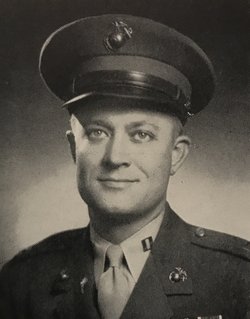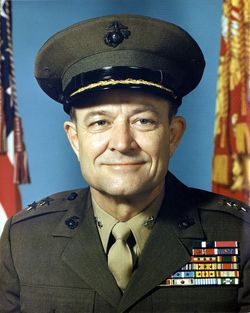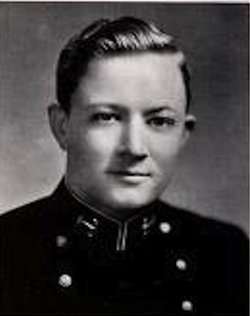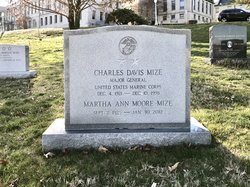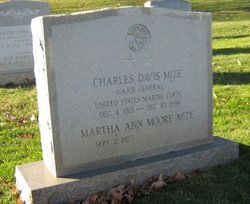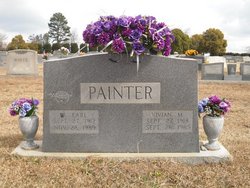| Description |
: |
Charles Mize, Marine in 3 Wars, Dies at 77
By RICHARD GOLDSTEIN
Published: December 27, 1998
Maj. Gen. Charles D. Mize, a combat veteran of three wars who won the Navy Cross with the First Marine Division in the Korean War and who was its commander a quarter-century later, died on Dec. 10 at Inova Alexandria
Hospital in Alexandria, Va. General Mize was 77 and lived in Falls Church, Va.
The cause was pneumonia, his family said.
General Mize wanted to be a country lawyer, but he was a marine for 32 years, fighting in epic campaigns from the battle for Okinawa in World...
Read More
|
Charles Mize, Marine in 3 Wars, Dies at 77
By RICHARD GOLDSTEIN
Published: December 27, 1998
Maj. Gen. Charles D. Mize, a combat veteran of three wars who won the Navy Cross with the First Marine Division in the Korean War and who was its commander a quarter-century later, died on Dec. 10 at Inova Alexandria
Hospital in Alexandria, Va. General Mize was 77 and lived in Falls Church, Va.
The cause was pneumonia, his family said.
General Mize wanted to be a country lawyer, but he was a marine for 32 years, fighting in epic campaigns from the battle for Okinawa in World War II, to retreating from the Chosin Reservoir in the Korean War, to rescuing troops in the Mekong Delta in the Vietnam War.
General Mize and his son Maj. Gen. David Mize, commander of the Marine Forces Reserve, were the sixth father and son in Marine Corps history to have both worn
a general's stars.
Last year, on the afternoon of a bright, pristine day in December, taps could be heard playing in the distance at the United States Naval Academy in Annapolis, Maryland, an institution founded in 1845, one year before the U.S. declared war against Mexico. The same bugle call is heard every night to signal mid-shipmen that another day has come to an end. But taps in the afternoon signifies something else to those familiar with life at this place where the mission--to produce graduates who will risk their lives defending their country--is laid out on a plaque in the middle of campus.
This time taps was the final act of a solemn ceremony honoring one for whom Annapolis had been the crucible. From all reports, Charles Davis Mize wasn't just a hero. He was a hero's hero, the kind of man this place was built to produce. Mize was Annapolis Class of 1945, graduated a year early because duty called amidst a raging war.
As it has done down through the years for tens of thousands of youths, Annapolis gave Mize a life far different from the one he left behind. It plucked him from Cave Spring, Georgia, and transported him to places with strange names like Okinawa, the Pusan Perimeter, and Saigon. There was no question in Charles Mize's mind that in 1945 when Tokyo Rose taunted, "Come and get us," he and his Annapolis classmates would take her up on the offer. The Japanese had 100,000 soldiers on the southern third of Okinawa Island, and Mize walked into the bloodiest battle of the Pacific war.
"If you could have offered my father a guarantee of 77 full years of life in 1945, when he was in the jungles of Okinawa, or again in the harrowing days of 1950 in Seoul or the Chosin Reservoir, or yet again in 1968 in Vietnam where he commanded under fire, I'm confident he would have thought that the offer was too good to be true," says his son David Mize, who, following in his father's footsteps, is now a major general in the Marine Corps.
Charles linked the Navy Cross, two Purple Hearts, and Bronze Star with combat V that he received to the Prayer of the Midshipman that he and his classmates had memorized and would never forget. The one that asks God to "Keep me true to my best self, guarding me against dishonesty in purpose and in deed, and helping me so to live that I can stand unashamed and unafraid before my shipmates, my loved ones, and Thee."
As much as that day in December memorialized Major General Charles Davis Mize, it also memorialized the United States Naval Academy. At those same battles where Mize distinguished himself, hundreds of other Annapolis-trained men from "the greatest generation" led American forces to victories small and large. But now, for many in the long pews teeming with retired warriors in precisely pressed suits and heavily starched shirts, the institution they left behind exists only as a memory.
|

